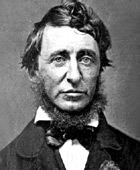Henry David Thoreau, (1817-1862) was born in Concord, Massachusetts, which was center of his life, although he spent several years in his childhood in the neighboring towns and later elsewhere. Thoreau studied at Concord Academy (1828-33), and at Harvard University, graduating in 1837. He was teacher in Canton, Massachusetts (1835-36), and at Center School (1837), resigning after two weeks. In 1835 he contracted tuberculosis and suffered from recurring bouts throughout his life.
From 1837-38 Thoreau worked in his father's pencil factory, and later in 1844 and 1849-50. He opened with his brother John a school in Concord and taught there in 1838-41 until his brother became fatally ill. From 1848 he was a regular lecturer at Concord Lyceym. He also worked as a land surveyor.
A decisive turning point in Thoreau's life came when he met Ralph Waldo Emerson in Concord. He was a member of Emerson household from 1841 to 1843, earning his living as a handyman. In 1843 he was a tutor to William Emerson's sons in Staten Island, New York, and in 1847-48 he again lived in Emerson's house.
In 1845 Thoreau built a home on the shores of Walden Point for twenty-eight dollars, and described his observations and speculations in A WEEK ON THE CONCORD AND MERRIMACK RIVERS (1849). The account was based on a trip he took with his brother in 1839. Thoreau's first book sold poorly and he remarked, "I have now a library of nearly nine hundred volumes, over seven hundred of which I wrote myself." Thoreau's most famous essay, CIVIL DISOBEDIENCE (1849), was a result of a overnight visit in 1846 in a jail, when he refused to pay his taxes in protest against the Mexican War and the extension of slavery. Later Thoreau lectured and wrote about the evils of slavery and helped fleeing slaves. In his famous statement, "the mass of men lead lives of quiet desperation," he crystallized his idea to be the one who has the courage to live, to stand against the trends of his own time.
Walden; or, Life in the Woods described a two-year period in Thoreau's life from March 1845 to September 1847. From the Fourth of July, the author retired from the town to live alone at Walden Pond. Much of Walden's material was derived from his journals and contains such pieces as 'Reading' and 'The Pond in the Winter.' "We are a race of titmen, and soar but a little higher in our intellectual flights than the columns of the daily paper" Thoreau wrote in 'Reading in Walden.' Other famous sections involve Thoreau's visits with a Canadian woodcutter and with an Irish family, a trip to Concord, and a description of his bean field. Although Walden has become an inspiration to all those who want to escape civilization, Thoreau himself took with him seed, lumber, clothes, nails, and other devices to survive - and his friends helped him to put the roof on his hut.
Although Thoreau never earned a living by his writings, his works fill 20 volumes. Among his many correspondence friends was H.G.O. Blake, once a Unitarian minister and later attached to the Transcendentalist, whom he wrote in December 1856: "I am grateful for what I am & have. My thanksgiving is perpetual. It is surprising how contended one can be with nothing definite - only a sense of existance." Aware that he was dying of tuberculosis, Thoreau cut short his travels and returned to Concord, where he prepared some of his journals for publication. He died at Concord on May 6, 1862. His letters were edited by his friend Emerson and published posthumously in 1865. POEMS OF NATURE appeared in 1895 and COLLECTED POEMS in 1943. Thoreau's collection of journals was published in 1906 in 14 volumes.
Thoreau's primary genre was essay, and his fascination with his natural surroundings is reflected in many of his writings dealing with totally different subjects. 'Natural History of Massachusetts' includes poetry, describes the Merrimack River, and discusses the best technique for spear-fishing. In 'Resistance to Civil Government', often reprinted with the title 'Civil Disobedience', Thoreau recommends disobeying unjust laws. "I think that we should be men first, and subjects afterward. It is not desirable to cultivate a respect for the law, so much as for the right." Many readers have pointed out that in 'Slavery in Massachusetts' Thoreau's defense of John Brown, when he raided on the armory at Harper's Ferry, contradicts his idea of passive resistance. In his final essay, 'Life Without Principle', the writer warns that working for money alone will never bring happiness. He attacks his contemporaries' fascination with news and gossips and explains how individuals must resist conformity in the search for truth.
In 1999 appeared Thoreau's WILD FRUITS, written over 130 years ago with henscratched handwriting. The text was born during the last decade of his life. Thoreau lived in the third-floor attic of his parents' house and recorded his observations about vegetation surrounding Concord. In Wild Fruits he argued against the destruction of the wilderness around him.
Biography from: readprint.com |






